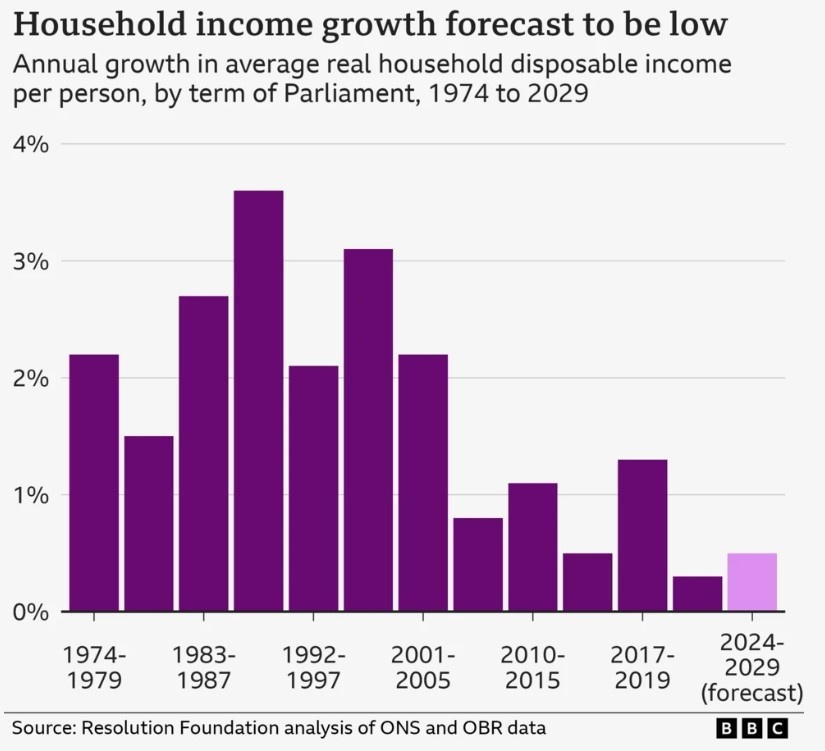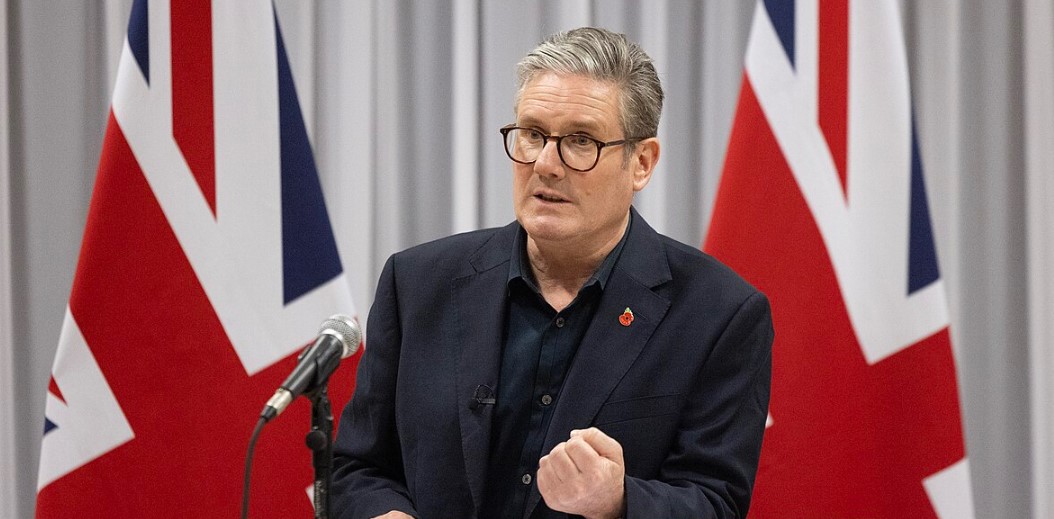Starmer’s speech last Wednesday was the latest rebrand. We had his ‘ten pledges’ when he fought for the Labour leadership…and they were immediately binned when he won. Two years ago, we had his five ‘missions’. Now we have a Plan for Change’and six ‘milestones’.
But however they are reheated, it will not be words – whether they are commitments, pledges, promises, policies, missions or milestones – on which his government will be judged at the next election. It will be living standards: are workers going to feel better or worse off?
The Prime Minister seemed to nod in that right direction by offering a plan to “raise living standards, so you have more money in your pocket”. Starmer promised to “give the British people the power to hold our feet to the fire” on this and other issues. To his discomfort, they will certainly do that, and it is not necessary to wait until 2029 to see which way the wind will be blowing the flames.
Voters are already judging Starmer’s government by its actions and not by its words. He has refused to remove the two-child limit on benefits and, piling on more misery, Chancellor Rachel Reeves has removed the winter fuel allowance for millions of pensioners. It is not a surprise that Labour is languishing near the bottom of opinion polls and is losing local council by-elections, many badly. One poll (Find out Now, December 4) even puts Labour third nationally behind the Tories and Reform UK.
Waiting lists for non-urgent procedures are a minor part of NHS crisis
The six ‘milestones’ announced by Starmer on Wednesday included three that were sufficiently vague as to be easily dodged when the time comes: feeling ‘safer in your community’, giving every child the ‘opportunity to achieve’ and ‘protecting’ those who pay energy bills, whatever that means. But others came dangerously close to being concrete, like raising living standards, and building 1.5 mn new homes.
And no-one would argue with a promise to reduce waiting times for medical treatments. But unfortunately the ‘milestone’, on health, was to end the backlog on elective treatment, as if that was the only metric by which workers can see the decline of the NHS.
There are other serious issues, like the difficulty in seeing a GP, the scarcity (or complete absence) of NHS dentistry in many areas, the paucity of resources in mental health, just to name a few. Worst of all, there is the issue of the low pay and overwork of NHS staff and the consequent huge chasm of unfilled vacancies.
Not one of these health issues is addressed by Starmer. Worse, there is a suspicion that Health Minister, Wes Streeting, rather than reduce the parasitism of the private sector – which is a huge drain on NHS resources and staff – aims to strengthen the hold of these sharks over the NHS. Even the six month-long ‘investigation’ which he has launched has been outsourced, at a cost of millions, to a private consultancy.
Hospitals already under “huge strain”
The medical director of NHS England last week issued dire warnings about the NHS lack of preparedness for the coming winter. He warned about rising rates of flu and the vomiting bug, which are putting hospitals “under huge strain”. It is only the start of December, but already 95% of hospital beds are occupied – and this is a rate of occupancy normally seen in the depths of winter.
Many pensioners deprived of their winter fuel allowance and suffering from the generalised crisis in living standards – higher food prices, energy costs, rents – will be less able to feed themselves or heat their homes this winter and will be more susceptible to respiratory illnesses in particular.
“Last week”, the BBC reported, “two-thirds of ambulances faced delays when they dropped patients at A&E. They are meant to be able to handover patients to hospital staff within 15 minutes of arriving, but last week 67% of arrivals took longer than that. The average handover time was just over 44 minutes”.
By focusing only on a target for non-urgent medical treatment, Starmer has side-stepped much more serious and pressing issues facing the service.

When it comes to house-building, it would not be enough to eliminate the crisis in the affordability of housing, but Starmer’s commitment to build, on average, 300,000 houses a year for five years would be welcome – if it were done. But the last time that many homes were built in one year was 1969, and house-building is dominated by half a dozen big builders who have a direct interest in maintaining a housing shortage to keep prices up.
As the Financial Times pointed out, “Private and public sector housebuilding in England totalled about 200,000 new homes in the year to March, resulting in 221,070 net additional dwellings — down 6 per cent from the year before”. Landlords, landowners and developers all gain from shortage, because it enhances rents and profits. Unless the profit motive is taken out of home-building – by cheap government loans to local authorities to build social housing – this government will not come anywhere near their housing target.
“Trade offs” and “difficult decisions”…the real ‘meat’ of Starmer’s speech
What is given much less attention by the media, but is very significant nonetheless, were Starmer’s warnings that there would be “trade offs” and “difficult decisions”. This was the real meat of his message and the ‘milestones’ are a glossy cover to hide what will, in effect, be a ‘Labour’ version of austerity. What he calls (correctly) the “managed decline” of the British economy is the responsibility of those with economic power and wealth – the capitalist class.
It has been their thirst for short-term profits at all costs that has led to the UK to have the lowest rate of investment of any camparable (G7) country. The answer being put forward by Starmer and Rachel Reeves, to “grow” the economy, will inevitably mean the reduction in the share of income that goes to ‘consumption’ – that is, household expenditure – to increase profits, to ‘encourage’ investment.
Although the official government forecast is for real disposable household income (RDHI) to increase, it is by the utterly miserable figure of only half of one per cent per year up to 2028. We should note that ‘official’ figures of inflation always underestimate the impact of rising prices on the poorest households, so what is an ‘official’ rise of half a percent in RDHI will in all likelihood translate into a cut in living standards.
The week following the ‘milestones’ speech, Starmer is introducting a spending review across all government departments, with ministers being told “to make their case for sparse public funds in a line-by-line haggle with the Treasury”. Starmer has warned ministers that they will have to fight for funds “within a tight Whitehall spending envelope” (Financial Times).
Bearing in mind the context – that Defence spending is planned to rise considerably – this means key government departments and services on which workers depend will be cut. The ‘milestones’ are looking increasingly like a thin layer of icing on a cake of manure.
Right-wing trade union leaders have facilitated Labour shift to the right
Keir Starmer managed to hang onto the Labour leadership after 2020, and blatantly and undemocratically forced the party to the right. Assisted by head office, the right wing faction has manoeuvred, tricked and fiddled their way into making sure that the overwhelming majority of Parliamentary Labour Party reflect their narrow point of view. There is only one reason why they have been able to get away with this, in four words: the trade union leadership.
In return for a promise of improved workers’ rights – “in the first hundred days” – the right wing leaders of the trade unions, especially UNISON, USDAW and GMB, allowed all kinds of undemocratic decisions to go through Labour’s NEC. But this cosy relationship will not last. It will be the members of these unions who will be asking – what has happened to our improved rights?
The Employment Rights Bill is still staggering its way through parliament and many of the improved rights it promises will not come into effect until 2026, a lot longer than “100 days”. Business leaders, Lib-Dem, Tory and right-wing Labour MPs are lobbying hard to get many of the measures in the bill watered down, so that when it comes into law – most likely in the New Year – it will be a pale shadow of what was promised to the unions.
Trade union leaders are already feeling the heat from their members. No fewer than 24 union leaders this week wrote a joint letter to Starmer (although, disgracefully, the GMB leader refused to sign), expressing their concern that Labour’s election manifesto commitment to “strengthen” sick pay was not being honoured.
This is a sign of things to come. By next Spring, the pay awards of around 5% that were given in July will have been eroded, with inflation already nudging 3%. Many trade union regional and national conferences take place in the early months of the year, and there will be a number of important contests for leading posts in the trade unions.
It will be the trade union membership who will hold their leaders’ feet to the fire – on living standards, on cuts and on workers’ rights, or the lack of them – and what will cap all this is the likelihood of massive Labour losses at the local elections next May. Starmer may think he will have an easy ride with his ‘milestones’ covering up for his “difficult decisions”, but events will prove otherwise. The grip that he and his faction have on the broader labour movement is weaker than he thinks and in time that will become apparent.
[Picture top from Wikimedia Commons, here]



